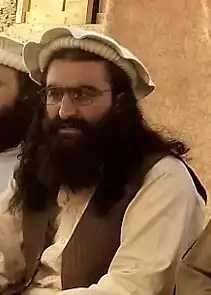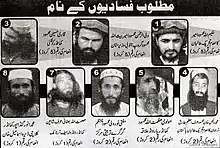Noor Wali Mehsud
Mufti Noor Wali Mehsud (Pashto/Urdu: مفتی نور ولی محسود) is a Pakistani militant and current emir of Tehrik-i-Taliban Pakistan (TTP).[1] On 22 June 2018, Mufti Noor Wali Mehsud was appointed emir after the assassination of former emir Mullah Fazlullah in a US drone strike in Afghanistan.[1][2] Mehsud took power over the TTP at its weakest point since its inception, as the TTP no longer holds territory in Pakistan and has been plagued by internal divisions.[3] Despite this, the TTP, since Mehsud's appointment appears to have been revitalized and has "grown deadlier".[4][5] The US classified Mehsud as a Specially Designated Global Terrorist on 10 September 2019.[6] In July 2020, Mehsud was included on the ISIL (Da'esh) and Al-Qaida Sanctions Committee list by the United Nations.[7]
Mufti Noor Wali Mehsud مفتی نور ولی محسود | |
|---|---|
 Mufti Noor Wali Mehsud in July 2018. | |
| 4th Emir of Tehrik-i-Taliban Pakistan | |
| Assumed office 22 June 2018[1] | |
| Preceded by | Maulana Fazlullah |
| Personal details | |
| Born | June 26, 1978[2] Tiarza Subdivision, South Waziristan, Khyber Pakhtunkhwa, Pakistan |
| Military service | |
| Allegiance | (1996–1998, 2001) (2003–present) |
| Years of service | 1996–1998 2001 2003–present |
| Rank | Emir of Tehrik-e-Taliban Pakistan |
| Battles/wars | |
Early life
Birth
Noor Wali Mehsud was born on 26 June 1978 in a village in the Tiarza Subdivision of the South Waziristan region of Khyber Pakhtunkhwa.[2][8][9] He hails from the Mechikhel sub-clan of the Mehsud tribe, a Pashtun tribe native to the Sararogha Subdivision of the South Waziristan region.[8][10][11]
Religious Education and Afghan Civil War
Throughout the 1990s, Mehsud studied on and off at madrasas Jamia Imdadia, Jamia Haleemia and Jamia Farooq-e-Azam in Faisalabad, Jamia Nusratul Uloom in Gujranwala, and Jamia Ahsan-ul-Uloom and Jamia Yaseenul Quran in Karachi.[11] Around 1996-1997, Mehsud's religious education was interrupted as he left to Afghanistan to fight alongside the Taliban and allied jihadist forces against Ahmad Shah Massoud's Northern Alliance.[9][11] He fought in various battles during the latter phase of the Afghan Civil War like the Battles of Mazar-i-Sharif (1997–98) and battles north of Kabul.[11] On his father's advide, Noor Wali Mehsud returned to Pakistan to finish his religious education, graduating in 1999.[11][10] Upon graduating, Mehsud started using the title mufti denoting his Islamic religious scholarship. Over the next two years, Mehsud taught Islamic theology at Madrassa Imdad-ul-Uloom in the Gorgoray area in South Waziristan.[9][11]
War on Terror
United States invasion of Afghanistan
Following the 2001 September 11th attacks and the subsequent United States invasion of Afghanistan, Mufti Noor Wali Mehsud returned to Afghanistan with a convoy of Deobandi Jamiat Ulema-e-Islam (F) fighters lead by Maulana Mirajuddin Mehsud in hopes of propping up the Taliban regime.[11][12] Despite the efforts of foreign jihadists, the Taliban government was overthrown by US and Northern Alliance forces in December 2001, prompting Mufti Noor Wali Mehsud to retreat across the border into Pakistan, along with droves of Afghan Taliban, Al-Qaeda, and other jihadist fighters.[11] Over the next year, Mufti Noor Wali Mehsud, along with many other jihadists and jihadist sympathizers in the Federally Administered Tribal Areas, sheltered fleeing Taliban and Al-Qaeda fighters, providing them a launching pad for their insurgent operations in neighboring Afghanistan.[11]
Under pressure from the US, Pakistan began deploying troops throughout the FATA and along the border with Afghanistan with the goal of apprehending jihadists seeking shelter in Pakistan.[13] This move was considered an unprecedented violation of the tribes's sovereignty and was condemned by many parties across Pakistan. Throughout 2002-2003, Pakistan began to intensify their military presence and began launching counter-terrorism operations within the FATA, only to be met by more condemnation and suspicion by various local tribes and political parties.[13][14] In addition, the local Pashtun tribes began to feel that they were being subjugated by the Pakistani military. Not only was their military presence a violation of their sovereignty, but according to Mufti Noor Wali Mehsud, Pakistan's demand for the release of the jihadists whom they sheltered would be a violation of the principle of Melmastia (hospitality), a major component of Pashtunwali (Pashtun tribal code).[11] It was in this environment, Mufti Noor Wali Mehsud saw the need for a "defensive jihad" in Pakistan to resist American imperialism.[11] Noor Wali joined the Mehsud branch of the Pakistani Taliban in 2003, shortly before the start of the War in Northwest Pakistan.[11]
Early insurgent activities
Fighting broke out on March 16, 2004 when the Pakistani army began an operation to clear out Al-Qaeda jihadists from the Wanna area in South Waziristan, being met with fierce resistance.[15] In this battle, Mufti Noor Wali Mehsud lead local Taliban fighters in an ambush of the Pakistani army in Tayar Manza.[9] The Battle of Wanna ended in a Pakistani victory, but marked the beginning of the War in Northwest Pakistan. A ceasefire was signed in April 2004, but was quickly broken, as fighting in the tribal areas continued throughout 2004. During a Pakistani military operation in September 2004, Mufti Noor Wali Mehsud was put in charge of the local organization and lead the local Talibans against the Pakistani army.[10]
Due to Noor Wali's religious education, he was made a qazi (judge) in a Taliban court formed by Baitullah Mehsud.[11][16][8] According to locals, Mufti Noor Wali Mehsud famously sentenced Pakistani Taliban leader Baitullah Mehsud to three days in jail.[9] During this period it is also believed Noor Wali served as a deputy to Baitullah Mehsud.[17][16][11]
Assassination of Benazir Bhutto
On December 27, 2007, former prime minister Benazir Bhutto was assassinated in Rawalpindi. After the overwhelming public backlash following the assassination, which included widespread rioting and property destruction, the TTP saw it necessary to save face by denying involvement in the assassination.[18][19] On December 29, Maulvi Omar, official spokesperson of Baitullah Mehsud released a statement denying involvement in Benazir Bhutto's assassination saying, "I strongly deny it. Tribal people have their own customs. We don't strike women."[20] In this same time, the Pakistani government released the transcript from an intercepted phone call between TTP members Maulvi Sahib "Mister cleric" and Baitullah Mehsud in which Maulvi Sahib claimed responsibility for the attack, saying "They were our men there" and that "There were Saeed, the second was Badarwala Bilal and Ikramullah was also there." Maulvi Sahib clarified that Ikramullah and Badarwala Bilal did it, before being congratulated by Baitullah Mehsud and agreeing to meet in Makin at "Anwar Shah's house."[21]
No one openly claimed responsibility for the assassination of Bhutto until 2017, when Mufti Noor Wali Mehsud, in his book, took credit for carrying out the assassination.[11][22] Mufti Noor Wali Mehsud explained that Benazir Bhutto "allegedly planned to collaborate with the US against the mujahideen if she returned to power," and that the Bhutto's return was "planned at the behest of the Americans as they had given her a plan against the Mujahideed-e-Islam. Baitullah had received information of the plan."[11][22] Due to the threat they believed she posed to the TTP, they decided to carry out the assassination, first in the October 18 Karachi bombing which failed to kill Bhutto and again in the successful December 27 assassination.
Mufti Noor Wali Mehsud also provided details on the attack from the TTP's perspective, mentioning that following the failed assassination attempt in October 2007, "the government had not taken appropriate security measures that made it possible for the attackers to have easy access to Benazir Bhutto in Rawalpindi," partially implicating then president, Pervez Musharraf in Bhutto's assassination.[22] Noor Wali mentions the assassination's masterminds Moulvi Imran, Ahmas alias Nasrullah, Qari Ismail, and Mullah Ihsan and their role in the planning of the attack.[11] Noor Wali also names Ikramullah and Badarwala Bilal as the bombers tasked with carrying out the attack, including a description of the attack, saying, "Bomber Bilal first fired at Benazir Bhutto from his pistol and the bullet hit her neck. Then he detonated his explosive jacket and blew himself up among the participants of the procession."[22] According to Noor Wali, Ikramullah never detonated his suicide belt and fled the scene to his home town of Makin before going to Afghanistan, where he resides now.[19][22]
Rising through the ranks

Following the assassination of Baitullah Mehsud, Noor Wali operated out of the Gorgoray area in his native South Waziristan. In 2009, he ran a TTP training camp in Gorgoray, as evidenced by the flyers sent out by the Pakistani government that placed bounties on high-level TTP commanders, provided pictures, and described their role in the organization. As of November 2009, Mufti Noor Wali Mehsud had a bounty of 2 million rupees placed on his head.[23]
References
- Ahmad, Jibran; Mehsud, Saud. "Pakistani Taliban appoints new chief after previous leader killed in drone strike". reuters.com. Retrieved 12 May 2020.
- "Pakistani Taliban appoints new chief after Mullah Fazlullah's death in recent US drone strike". firstpost.com. Retrieved 12 May 2020.
- "Mufti Noor Wali Mehsud becomes Pakistani Taliban leader". trtworld.com. Retrieved 12 May 2020.
- "U.S. designates Tehreek-e-Taliban Pakistan chief Noor Wali Mehsud as global terrorist". thehindu.com. Retrieved 12 May 2020.
- Zahid, Farhan. "TTP's Future Under the Leadership of New Emir Noor Wali Mehsud". jamestown.org. Retrieved 20 August 2020.
- Jha, Nikhil. "US designates Mufti Noor Wali Mehsud 'Specially Designated Global Terrorist': Who is he?". timesnownews.com. Retrieved 12 May 2020.
- "Noor Wali Mehsud". United Nations.
- Mehsud, Sailab. "TTP chief yet to approve Wali's appointment". Dawn.com. Retrieved 13 May 2020.
- Khattak, Daud. "Who Will Be the Next Leader of the Pakistani Taliban?". Thediplomat.com. Retrieved 13 May 2020.
- "Noor Wali Mehsud (Alive) – Afghanistan/Pakistan". ITCT.org. Retrieved 13 May 2020.
- Zahid, Farhan. "Profile of New TTP Chief Mufti Noor Wali Mehsud: Challenges and Implications". pakpips.com. PIPS. Retrieved 7 June 2020.
- "JUI-F leader gunned down in Tank". dawn.com. Retrieved 7 June 2020.
- "Govt warned against US operation in Fata". dawn.com. Retrieved 11 June 2020.
- "Wana operation condemned". dawn.com. Retrieved 12 June 2020.
- "Top Al Qaeda leader hurt, hiding in Wana: ISPR". dawn.com. Retrieved 24 July 2020.
- "TTP appoints Mufti Noor Wali Mehsud as chief after Fazlullah's killing". dawn.com. Retrieved 20 August 2020.
- "Mapping Militant Organizations. "Tehrik-i-Taliban Pakistan."". cisac.fsi.stanford.edu. Stanford University. Retrieved 20 August 2020.
- "Bhutto's Party to Decide Successor". aljazeera.net. Al Jazeera. Retrieved 13 December 2020.
- Kermani, Secunder; Mehsud, Saleem. "Benazir Bhutto Assassination: 'Most Wanted' in Murder Resurfaces". bbc.com. BBC. Retrieved 13 December 2020.
- "Al Qaeda Militant Did Not Kill Bhutto: Spokesman". abc.net.au. Retrieved 13 December 2020.
- "Transcript of Alleged al-Qaida Intercept". The Associated Press. The Associated Press. Retrieved 13 December 2020.
- "We Killed Benazir Bhutto, TTP Claims in its Book". tribune.com.pk. The Express Tribune. Retrieved 13 December 2020.
- "Pakistan offers Taliban bounties". bbc.co.uk. BBC. Retrieved 20 August 2020.
| Military offices | ||
|---|---|---|
| Preceded by Maulana Fazlullah |
Leader of Pakistani Taliban 2018–present |
Succeeded by Incumbent |